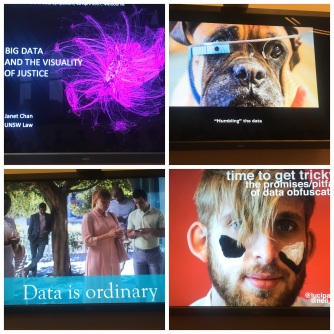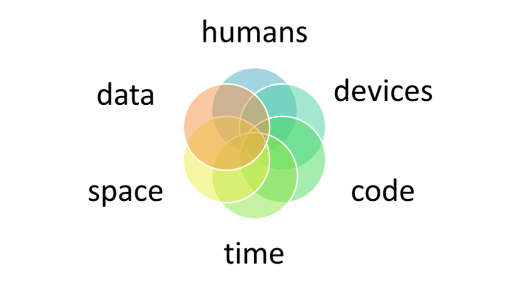We held our first research symposium on 28 April 2017. Sixteen papers were presented by our members, with sessions chaired by the co-leaders of the DD&SC, Professors Deborah Lupton, Deb Verhoeven and Sarah Pink.
Program
Panel 1
9:30 Data-driven governance and resistance: the case of speed enforcement, Gavin J.D. Smith (ANU) & Pat O’Malley (ANU)
9:50 Big Data and the Visuality of Justice, Janet Chan (UNSW)
10:10 The politics of data storage in Singapore, Tanya Notley (UWS)
10:30 The Social Life of Performance Data: of audit trails and governing professionals, Paul Henman (UQ)
10:50 Panel Q & A
11:10 – 11:25 Morning Break
Panel 2
11:30 Locating responsibility for data, Lyria Bennett Moses (UNSW)
11:50 More than Social: The Social Life of Data and its more-than-human counterparts, Larissa Hjorth (RMIT), Ingrid Richardson (Murdoch University) and Yolande Strengers (RMIT)
12:10 Ethics, evidence and the smartphone in a digital world: challenges and solutions for managing data lifespan and access, Adrian G. Dyer, Jair E. Garcia, Detlef Rohr, Edgar Gomez Cruz, Marta Poblet Balcell (RMIT)
12:30 Conceptualising information fluency, Sora Park (UC)
12:50 Panel Q & A
13:10 – 13:55 Lunch Break
Panel 3
14:00 Photos should be made mandatory: risk and intimacy in social data cultures, Kath Albury (UNSW)
14:20 Vernacular Data Cultures in Mobile Dating and Hookup Apps, Jean Burgess (QUT)
14:40 Dating and Hook-up Apps and the Circumvention of Location, Rowan Wilken (RMIT)
13:00 Time to get tricky? The promises and pitfalls of data obfuscation, Neil Selwyn (MU) & Luci Pangrazio (DU)
15:20 Panel Q & A
15:40 – 15: 50 Afternoon Break
Panel 4
15:50 Shifting perspectives: Learning from or knowing with personal data? Vaike Fors (Halmstad University, Sweden)
16:10 From parents to nudges: reflections on smart authorities, Martin Berg (Malmö University, Sweden)
16:30 Data Publics: Extracting Social Value from Facebook Page Data, Anthony McCosker (SUT)
16:50 Big Data and the Future of Audience Research, Adrian Athique (UQ)
17:10 Panel Q & A
17:30 Close



 Personal digital data assemblages
Personal digital data assemblages